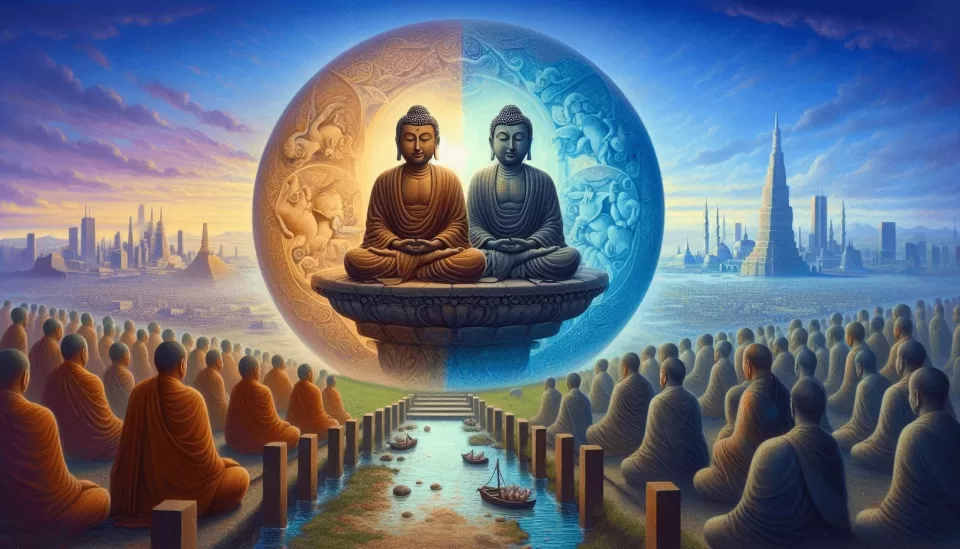Zen and the Art of Non-Duality: Transforming Politics through Inner Peace
Introduction: Beyond the Political Divide
Have you ever felt the sting of political divisiveness, wishing for a path that transcends the relentless ego-driven conflicts so prevalent in today’s headlines? Imagine a perspective so profound that it not only transforms our understanding of politics but also cultivates a deeper sense of inner peace and connection. Zen philosophy, with its emphasis on present-moment awareness and the release of ego, offers a unique lens through which we can view the often tumultuous world of politics. While Zen doesn’t prescribe specific political actions, it lays the groundwork for inner transformation, leading to a more compassionate and mindful approach to navigating our complex world. In this article, we explore the intricate dance between true religion and political ambition, and how Zen philosophy illuminates this dynamic, fostering a path to a more empathetic and harmonious society.
Religion vs. Politics: The Fundamental Conflict
At its essence, religion is a quest for meaning that extends beyond the individual self. It embodies qualities such as compassion, selflessness, and living in harmony with something greater than ourselves. Politics, conversely, often operates in a realm dominated by ambition, power struggles, and a relentless pursuit of victory. These two forces, seemingly at odds, create a fundamental tension that can challenge our understanding of both religion and politics.
The Poison of Ego in Politics
Consider politics as a high-stakes game of chess, where each player strategizes, anticipates moves, and seeks dominance. This drive for power is frequently fueled by ego—a sense of separation and the need to assert superiority. As the saying goes, “power corrupts, and absolute power corrupts absolutely.” When ego takes center stage, collaboration and compromise are sacrificed at the altar of self-interest and manipulation.
The Blind Ambition of the Ego Trip
The political arena can often become a breeding ground for what we might call an “ego trip”—a pursuit of power and recognition driven by self-gratification. This insatiable hunger for more can lead to policies that prioritize personal gain over the public good. Picture a politician more concerned with securing their re-election than addressing the pressing needs of their constituents. Such behavior is symptomatic of an ego-driven approach that undermines the very principles of effective governance.
Zen: A Path of Inner Peace and Non-Duality
Zen Buddhism, a branch of Mahayana Buddhism, centers around mindfulness and meditation as pathways to enlightenment. At the heart of Zen is the concept of “non-duality,” the realization that the self and the world are not separate entities but interconnected. This profound understanding fosters compassion and a deeper sense of unity with others.
Letting Go of Ego Through Meditation
Zen meditation practices, such as zazen (seated meditation) and koan study (contemplation of paradoxical questions), are designed to cultivate a heightened awareness of one’s thoughts and emotions. By observing the ego’s activities, practitioners can gradually release its grip, moving towards a more peaceful and mindful state of being. This practice involves letting go of the need for control and self-importance, allowing for a more authentic connection with the present moment.
From Individual Transformation to Societal Change
While Zen does not advocate for specific political reforms, the inner transformation it promotes can significantly impact the world around us. As individuals develop qualities such as compassion, empathy, and interconnectedness, their interactions become more mindful and cooperative. This ripple effect can contribute to a more peaceful and collaborative society.
The Paradox of Religion in the Political Sphere
A thought-provoking question arises: can a religion truly maintain its essence when entangled with politics? History provides examples of religious institutions wielding political power—sometimes for benevolent purposes, other times with detrimental effects. This paradox highlights the ongoing tension between spiritual ideals and political realities.
The Duality of Religious Institutions
Many established religions navigate a complex relationship with politics. While they may offer moral guidance and social services, they can also become ensnared in power struggles and political agendas. This duality underscores the constant tension between the spiritual values at the core of religion and the practicalities of the political sphere.
The Power of the Individual: Buddha vs. Buddhism
The distinction between the founder of a religion and the institution that follows can be crucial. Figures such as Buddha or Jesus embodied profound spiritual principles. However, the institutions that arise around their teachings can become politicized over time. This distinction emphasizes the importance of personal spiritual practice and the potential pitfalls of organized religion.
Embracing Non-Duality: A New Approach to Politics
Does Zen philosophy suggest that we should abandon politics altogether? Not necessarily. Instead, it encourages us to engage with the world in a mindful manner. Envision a politician who, grounded in the principles of non-duality, approaches political decisions with the well-being of all in mind. Such a leader would prioritize collaboration, seek win-win solutions, and lead with genuine compassion.
Cultivating Mindfulness in the Political Sphere
Introducing Zen principles into politics may seem challenging, yet it holds transformative potential. Imagine politicians who engage in mindfulness meditation to cultivate inner peace before pivotal debates or decision-making processes. This practice could lead to more thoughtful, compassionate, and effective governance.
graph TD
A[Zen Philosophy] --> B[Inner Transformation]
B --> C[Increased Compassion]
C --> D[Enhanced Political Engagement]
D --> E[Mindful Decision Making]
E --> F[More Cooperative Society]
A --> G[Non-Duality Understanding]
G --> H[Reduction of Ego]
H --> I[More Empathetic Leadership]Conclusion: Toward a More Mindful Political Landscape
Zen philosophy offers a profound lens through which we can reimagine our approach to politics. By fostering inner peace and embracing non-duality, we can transcend the divisive nature of ego-driven politics and work towards a more harmonious and compassionate society. Through mindful engagement and a commitment to spiritual principles, we have the potential to transform not only our own lives but also the world around us.

